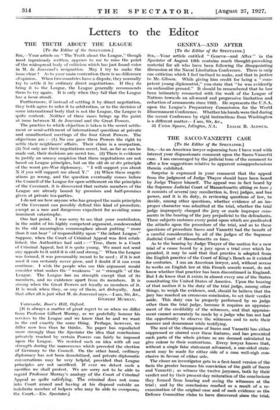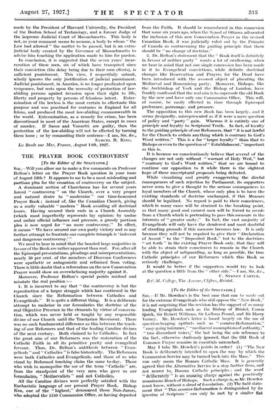THE SACCO-VANZETTI CASE [To the Editor of the SPECTATOR.]
Sin,—As an American lawyer sojourning here I have read with interest your dispassionate comment upon the Sacco-Vanzetti case. I am encouraged by the judicial tone of the comment to offer a few suggestions relative to apparent misapprehensions therein exhibited.
Surprise is expressed in your comment that the appeal
from the judgment of Judge Thayer should haye been heard by Judge Thayer himself. The appeal was in fact heard by the Supreme Judicial Court of Massachusetts sitting en bane ; it consists of several (my recollection is, five) judges, and has power, and it is its duty, in reviewing questions of law, to decide, among other questions, whether evidence of an im- proper character was admitted at the trial, whether the trial judge improperly charged the jury or made improper com- ments in the hearing of the jury prejudicial to the defendants. These subjects embrace every point upon which are predicated the attacks upon the procedure of the trial, and as to these questions of procedure Sacco and Vanzetti had the benefit of a careful consideration by all of the judges of the Supreme Judicial Court of Massachusetts en bane.
As to the hearing by Judge Thayer of the motion for a new trial of a cause heard by a jury upon a trial over which he presided, it may be said that that practice is adopted from the English practice of the Court of King's Bench as it existed for centuries. I am an American lawyer, and, without access to works on English law at this French seaside resort, do not know whether that practice has been discontinued in England. But I do know that it exists in almost every one of the States constituting the United States of America. Upon the hearing of that motion it is the duty of the trial judge, among other things, to weigh the evidence, and, should he believe that the jury has reached an erroneous conclusion, to set their verdict aside. This duty can be properly performed by no judge other than the trial judge, because it requires an appraise- ment of the credibility of the witnesses, and that appraise- ment cannot accurately be made by a judge who has not had the opportunity to observe the witnesses and to note their manner and demeanour while testifying.
The zeal of the champions of Sacco and Vanzetti has either suppressed or slurred over these features, and has presented such parts of the whole picture as are deemed calculated to give colour to their contentions. Every lawyer knows that, without a single false statement advanced, a one-sided state- ment may be made for either side of a case well-nigh con- clusive in favour of either side.
The closer an investigator gets to a first-hand version of the facts the greater becomes his conviction of the guilt of Sacco and Vanzetti ; as witness the twelve jurymen, both by their verdict and by their present-day reiteration of the conclusions they formed from hearing and seeing the witnesses at the trial ; and by the conclusions reached as a result of a re- examination of the original case and of such evidence as the Defence Committee claim to have discovered since the trial.
made by the President of Harvard University, the President of the Boston School of Technology, and a former Judge of the Supreme Judicial Court of Massachusetts. This body is not, as your comment seems to assume, a body to whom the Law had allowed " the matter to be passed, but is an extra- judicial body created by the Governor of Massachusetts to advise him touching the application made to him for pardon.
In conclusion, it is suggested that the seven years' incar- ceration of these men, six of which have transpired since their conviction (the delay being due to their own efforts), is sufficient punishment. This view, I respectfully submit, wholly ignores the only justification of judicial punishment. Judicial punishment, in America, is no longer predicated upon vengeance, but rests upon the necessity of protection of law- abiding persons against invasion upon their right to life, liberty and property by persons of felonious intent. Exter- inination of the lawless is the most certain to effectuate this purpose and was practised for centuries in England for all felons, and produced the most law-abiding commonwealth in the world. Extermination, as a remedy for crime, has been discontinued in most of the American States, except in cases of murder. If Sacco and Vanzetti are guilty, then the protection of the law-abiding will not be effected by turning them loose ; or by commuting their sentence—I am, Sir, &c., SAMUEL B. KING.
La Battle sur Mer, France, August 14th, 1927.



































 Previous page
Previous page